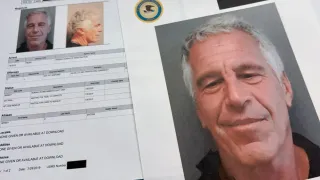January 29, 2017
Calif. Bill Would Allow 'Non-Binary' on Docs
Seth Hemmelgarn READ TIME: 3 MIN.
California state Senators Toni Atkins and Scott Wiener have introduced a bill that would allow people to choose "non-binary" as the gender on their birth certificates and other documents.
Senate Bill 179 - the Gender Recognition Act of 2017 - would also streamline the process people use to update their gender and names on documents. One change would be that people would no longer need a letter from their doctor attesting to medical treatment.
The bill, which Atkins (D-San Diego) and Wiener (D-San Francisco) introduced Tuesday, January 24, would go into effect January 1, 2018 if approved by the Legislature and signed by Governor Jerry Brown.
The state would be the first in the country to have a third-gender marker for non-binary people.
People face "so much confusion" during interactions like going through airport security or buying something with a credit card if "they're ID doesn't exactly look like or match who they present themselves to be," Atkins, a lesbian, said.
She noted that when she was in the state Assembly, she authored Assembly Bill 1121, the Name Changes and Birth/Death Certificates Act, to simplify the processes people have to go through to legally change their name and gender. Brown signed that bill into law in 2013.
"As we delved into this, more and more issues just came up that called out for additional legislation" and "clarification," Atkins said in an interview Tuesday.
Among other provisions, SB 179 would allow people under 18 to apply to update the gender on their birth certificate.
"I have personal friends I know who had to confront and face this issue with their children" who were as young as 3, Atkins said. "I was just blown away."
The bill is an opportunity "to advance civil rights for a community. It is about evolving thoughts around who we identify as as individuals," she said.
Wiener, who's gay, said, "I think as other states move to ostracize and marginalize transgender people with bathroom bills and other attacks, it's even more important for California to go in the other direction and embrace our transgender brothers and sisters.
"As someone is transitioning, there are so many obstacles and challenges, and the state of California should not be one of those obstacles," he continued. "We need to make it easier for people to go through a transition which is already a difficult period for a lot of people, and we can make it easier by modernizing our laws."
Atkins said opposition would likely come from the same conservative groups that have opposed past equality work.
"I can just imagine the comments we might get from some of our colleagues," she said.
However, Atkins added, "I have a feeling we're going to have a lot of support."
"This will send a very powerful message nationally," Wiener said.
"There are so many transgender people around the country who are terrified right now," he said. "They see states passing laws to strip them of their most basic rights."
The administration of newly inaugurated President Donald Trump is "openly hostile," Wiener said, and "This is a role California must play."
He said the message is, "No, we're going to go the other way, and be progressive and supportive and help people who need help."
"I'm just really excited to do this," Atkins said. "... Given all that we're faced with after this election, California continues to move forward. We have been at the forefront for rights for all individuals," including immigrants, women, and others, she said.
"This is going to be a step forward that will help us make a point to people across the country," Atkins said. "We're not backing down on equal rights in any way, shape, or form ... We're moving forward."
J.M. Jaffe, 29, who identifies as transgender and uses third-person pronouns, said they're "still deciding" whether they would change their documents to non-binary, but "at least the possibility being available is very exciting to me."






